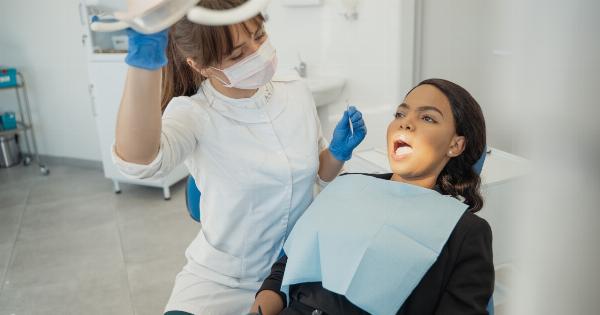Menopause is a natural biological process that marks the end of a woman’s reproductive years. It is characterized by a decline in the production of reproductive hormones, particularly estrogen and progesterone.
Menopause typically occurs between the ages of 45 and 55, with the average age being 51. While menopause is a normal part of aging, it can bring about various physical and emotional symptoms that can significantly affect a woman’s quality of life.
Common Symptoms of Menopause
Menopause is associated with a range of symptoms, which can vary from woman to woman. Some of the most common symptoms include:.
1. Hot flashes: Hot flashes are sudden feelings of warmth that are most commonly experienced in the face, neck, and chest. They can cause sweating and a flushed appearance.
2. Night sweats: Night sweats are hot flashes that occur during sleep, often leading to disrupted sleep and night-time awakenings.
3. Vaginal dryness: Decreased estrogen levels can result in vaginal dryness, which can cause discomfort during sexual intercourse.
4. Mood changes: Many women experience mood swings, irritability, and a decline in emotional well-being during menopause.
5. Sleep disturbances: Menopause can disrupt sleep patterns, leading to insomnia or poor quality sleep.
6. Weight gain: Hormonal changes during menopause can contribute to weight gain, especially around the abdomen.
7. Fatigue: Many women report feeling tired and having low energy levels during menopause.
8. Changes in libido: Fluctuating hormone levels can lead to a decreased desire for sexual activity and changes in sexual satisfaction.
Hormonal Therapy for Menopause
One of the most effective ways to manage the symptoms of menopause is through hormonal therapy. Hormonal therapy involves the use of medications that contain hormones, primarily estrogen and progesterone, to supplement the declining levels in the body.
There are different types of hormonal therapy available, including:.
1. Estrogen Therapy
Estrogen therapy involves taking estrogen alone, usually in the form of a pill, patch, gel, or cream.
It is most commonly prescribed to women who have undergone a hysterectomy (surgical removal of the uterus) because they do not require progesterone to protect the uterus lining. Estrogen therapy can effectively reduce hot flashes, vaginal dryness, and prevent bone loss.
2. Combination Therapy
Combination therapy involves taking both estrogen and progestin (a synthetic form of progesterone).
This type of hormonal therapy is prescribed to women who have not undergone a hysterectomy because estrogen alone can increase the risk of uterine cancer. Combination therapy can provide relief from menopausal symptoms and also protect the uterus lining from excessive growth.
3. Local Estrogen Treatment
Local estrogen treatment involves the use of creams, tablets, or vaginal rings that deliver a low dose of estrogen specifically to the vaginal area. This type of treatment can alleviate symptoms of vaginal dryness and discomfort during intercourse.
Benefits of Hormonal Therapy
Hormonal therapy can offer significant relief from menopausal symptoms and improve a woman’s overall well-being. Some of the benefits of hormonal therapy include:.
1. Reduction in hot flashes: Hormonal therapy can effectively reduce the frequency and severity of hot flashes, which can significantly improve a woman’s quality of life.
2. Improved bone health: Estrogen plays a crucial role in maintaining bone density. Hormonal therapy can help prevent bone loss and reduce the risk of osteoporosis and fractures.
3. Relief from vaginal symptoms: Estrogen therapy, including local treatments, can alleviate vaginal dryness, itching, and discomfort, making sexual intercourse more enjoyable.
4. Enhanced mood and emotional well-being: Hormonal therapy can help stabilize hormone levels, addressing mood swings and promoting emotional stability.
5. Prevention of certain conditions: Hormonal therapy has been shown to reduce the risk of colorectal cancer and may also provide cardiovascular benefits in some women.
Risks and Side Effects of Hormonal Therapy
While hormonal therapy offers many benefits, it is essential to be aware of the potential risks and side effects. These can vary depending on the type of hormonal therapy and individual factors. Some of the risks and side effects include:.
1. Increased risk of blood clots: Taking estrogen, especially in pill form, can slightly increase the risk of developing blood clots, which can lead to deep vein thrombosis or pulmonary embolism.
2. Increased risk of certain cancers: Long-term use of hormonal therapy may slightly increase the risk of breast, ovarian, and uterine cancer. The risk is higher with combination therapy compared to estrogen therapy alone.
3. Breast tenderness: Hormonal therapy can cause breast tenderness or enlargement in some women.
4. Nausea: Some women may experience nausea or other digestive discomfort when starting hormonal therapy.
5. Fluid retention: Hormonal therapy can lead to fluid retention, causing bloating or swelling in the hands, feet, or ankles.
Consulting a Healthcare Professional
Before starting hormonal therapy or making any decisions about menopause management, it is crucial to consult with a healthcare professional.
A healthcare provider can evaluate individual risk factors, discuss the benefits and potential side effects of hormonal therapy, and provide personalized recommendations.
Lifestyle Modifications and Alternative Therapies
In addition to hormonal therapy, lifestyle modifications and alternative therapies can also help manage menopausal symptoms. Some strategies that may provide relief include:.
1. Regular exercise: Engaging in regular physical activity can improve overall well-being and alleviate certain symptoms like hot flashes and mood swings.
2. Healthy diet: Consuming a balanced diet rich in fruits, vegetables, whole grains, and lean proteins can support overall health and help manage weight gain during menopause.
3. Stress reduction techniques: Practicing stress-reducing techniques such as meditation, deep breathing exercises, or yoga can help alleviate mood swings and improve sleep quality.
4. Natural supplements: Some women find relief from menopausal symptoms by using natural supplements like black cohosh, evening primrose oil, or soy isoflavones.
However, it’s important to discuss their use with a healthcare provider.
Conclusion
Menopause is a natural phase of life that brings about various physical and emotional changes. Hormonal therapy is an effective approach to manage menopausal symptoms and improve overall well-being.
However, it is essential to weigh the benefits against the potential risks and side effects and make informed decisions in consultation with a healthcare professional. Incorporating lifestyle modifications and alternative therapies can also contribute to a smoother menopausal transition.



























